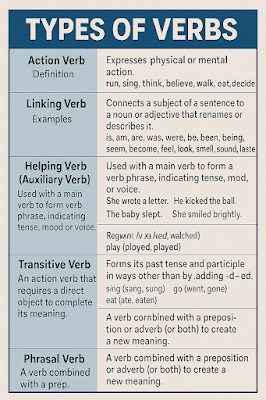(Source: Chat GPT)
If nouns are the naming words, then verbs are the action words – or the "doing" words – that bring our sentences to life! They are absolutely essential for telling us what's happening, what state something is in, or what someone possesses.
What is a Verb?
A verb is a part of speech that tells us:
What the subject does: Rohit plays cricket.
What happens to the subject: The ball was hit.
What state the subject is in: Mr. Shah is a doctor.
What the subject possesses: I have two pens.
Verbs are the engine of every sentence, driving the meaning forward.
Why Are Verbs So Important?
Without verbs, sentences wouldn't make sense! They provide the crucial information about actions, states, or occurrences, making communication dynamic and complete.
A Quick Look at Verb Types:
Verbs come in several categories, each with a distinct role:
Action Verbs: These express a physical or mental action.
Examples: go, speak, run, eat, play, think, believe
Linking Verbs: These connect the subject to a word that describes or renames it. They don't show action.
Examples: am, is, are, was, were, seem, become, feel, taste (e.g., Manisha is intelligent.)
Helping Verbs (Auxiliary Verbs): These work with a main verb to form a verb phrase, indicating tense, mood, or voice.
Examples: be (is, am, are), do (does, did), have (has, had), can, could, will, would, must
Transitive Verbs: An action verb that needs a direct object to complete its meaning.
Example: He drank a glass of water. (drank what? a glass of water)
Intransitive Verbs: An action verb that does not need a direct object to complete its meaning.
Example: She sang beautifully. (sang, but no direct object receiving the action)
Regular Verbs: Form their past tense and past participle by adding '-d' or '-ed'.
Examples: cook (cooked), smile (smiled), clean (cleaned)
Irregular Verbs: Form their past tense and past participle in unique ways, not by adding '-d' or '-ed'.
Examples: go (went, gone), eat (ate, eaten), sing (sang, sung)
Phrasal Verbs: A verb combined with a preposition or adverb (or both) to create a new meaning.
Examples: look up, break down, get along
(Source: Chat GPT)
Quiz: Test Your Verb Knowledge!
Fill in the Blanks: Identify the Correct Verb Type or Form!
Instructions: Complete each sentence by choosing the correct verb form or identifying the type of verb.
The children often ______ (play) in the park. (Choose the correct form of the verb)
In the sentence "The flowers smelled lovely," "smelled" is primarily a ______ verb. A. Action B. Helping C. Linking D. Transitive
She ______ (write) a letter. (Choose the correct form of the verb for a simple past action)
Which of these is an example of an Intransitive Verb? A. kick (the ball) B. read (a book) C. sleep (peacefully) D. give (a gift)
The word "cooked" is the past tense of "cook." This makes "cook" a ______ verb. A. Irregular B. Regular C. Linking D. Phrasal






.jpg)











.jpg)